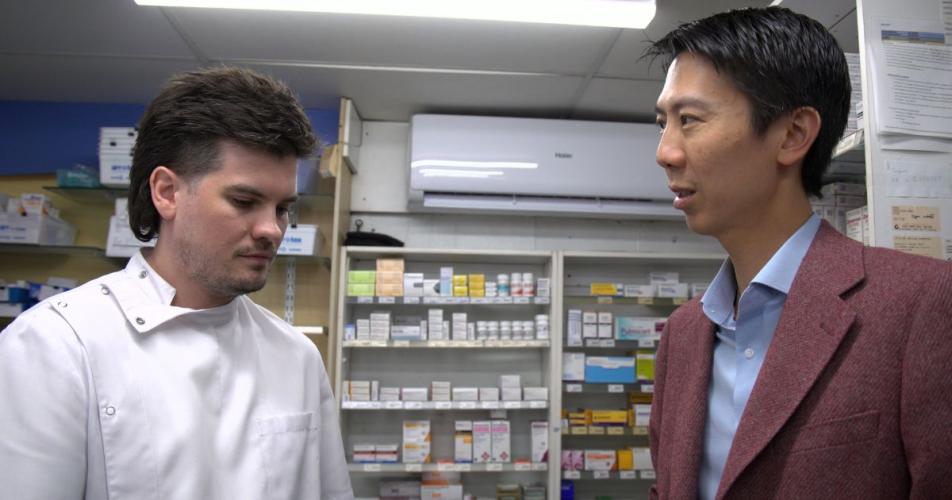Proposed pharmacy ownership laws will create new problems
Current pharmacy business ownership laws are already highly uncompetitive, and the draft bill restricting which pharmacists can own a pharmacy will further limit access to medications for some of our high-risk populations by excluding Aboriginal community-controlled health organisations, completely disregarding the National Agreement on Closing the Gap, AMA Queensland Vice President Nick Yim told ABC radio.

Transcript: AMA Queensland Vice President, Dr Nick Yim, ABC Radio Brisbane Steve Austin, Wednesday 6 March 2024
Subjects: Pharmacy Business Ownership Bill
STEVE AUSTIN: Steve Austin's my name, it is great to have your company this morning. Who can own a pharmacy here in Queensland? I'm wondering whether you even care who owns it. But the question is, should supermarkets be allowed to dispense medical prescriptions?
This Friday, the State Government is due to deliver its response to submissions to the draft Pharmacy Ownership Bill. And believe it or not, for years there has been huge lobbying going on behind the scenes around this by both the pharmacy lobby, supermarkets, doctors. It's really been one of those behind the scenes fight, I guess.
The bill sets out who can own a pharmacy here in Queensland. They would need a licence from the State Government, and a regulatory body would be set up to make sure that everyone is following the rules. Whether you think regulations work or not, let's go to my guest, Dr Nick Yim. Dr Yim is the Vice President of the Australian Medical Association of Queensland. Ironically, he began his career as a pharmacist. I asked him about this earlier on this morning.
DR NICK YIM: So, on this pharmacy business bill in general, it's come as quite a surprise to AMA Queensland. We feel that these proposed laws are simply unnecessary, and to paraphrase the Federal Productivity Commissioner, there is no evidence of a problem to fix and there is no evidence that if there were a problem, that this bill would actually fix it.
STEVE AUSTIN: So, what does AMA Queensland think about the ability of places, perhaps like supermarkets, to dispense medical prescriptions in sort of a in a chemist-like outlet?
DR NICK YIM: I think the key thing is, currently the pharmacy business ownership laws are highly uncompetitive. It is one of those few industries where only a pharmacist can own a pharmacy, and that's not the case with any other healthcare business. For, example, a pharmacist can own a general practice, but a GP can't own a pharmacy.
STEVE AUSTIN: I was unaware of that. So, a pharmacist can own a medical centre, but a GP can't own or run a pharmacy?
DR NICK YIM: Correct.
STEVE AUSTIN: That's odd.
DR NICK YIM: Yes. And this bill takes it even further by establishing a Pharmacy Business Ownership Council to regulate which pharmacists can own a pharmacy.
STEVE AUSTIN: Does the AMA Queensland want to see the bill passed in Queensland?
DR NICK YIM: We don't want to see this bill passed. We've made our submissions, and I think one of the key things is, it potentially will restrict access to medications for some of our high-risk populations.
STEVE AUSTIN: How?
DR NICK YIM: Currently the proposal, if it passes, the bill disregards the National Agreement on Closing the Gap. Aboriginal community-controlled health organisations would not be able to run pharmacies.
STEVE AUSTIN: Okay I wasn't aware of that. Was AMA Queensland consulted on the draft bill?
DR NICK YIM: So, the bill was negotiated secretly between October 2022 and March 2023.
STEVE AUSTIN: Negotiated secretly between which parties?
DR NICK YIM: Obviously the Pharmacy Guild. We were invited along with the RACGP.
STEVE AUSTIN: The Royal Australian College of General Practitioners, that would be?
DR NICK YIM: Yes, but our invitation appeared to have been lost in the mail. We made some serious objections to Queensland Health in early 2023 when we realised the fact that we weren't invited or received that invitation.
STEVE AUSTIN: So, I'm trying to work out what you're telling me, is that this was a deal was done by the lobbying of pharmacies in Queensland to the State Government, and the AMA and the Royal Australian College of General Practitioners were not invited to the initial meetings?
DR NICK YIM: Apparently we were, but that invitation was lost in the mail apparently.
STEVE AUSTIN: So, they say they invited you, but you never saw the invitation?
DR NICK YIM: Correct.
STEVE AUSTIN: All right, my guest is Dr Nick Yim. Dr Yim is Vice President of the Australian Medical Association of Queensland. And ironically, he began his career as a pharmacist. Steve Austin's my name. As a consumer, should I be worried about who owns the pharmacy or the chemist that I go to, Nick Yim?
DR NICK YIM: I think at the moment there's many other health businesses, as I said earlier. Non-doctors own general practices, so many general practices that you might attend around the community might not be owned by a doctor. I think there needs to be appropriate governance structures within those individual businesses, and obviously we as health practitioners are governed by the Health Practitioners Act and the agency, Ahpra. So there are protections in place for our community.
STEVE AUSTIN: Do you support a ban, do you want to see that ban continue?
DR NICK YIM: I think there are challenges in that there obviously needs to be governance and structures in place to ensure our community access is important. And that's just not access in metropolitan areas, that needs to be access across regional and rural areas. So, for example, in a rural area, there might not be a big supermarket, there might be a small IGA, or a small community store, and maybe that is the best location for a pharmacy to exist.
STEVE AUSTIN: Why is this such a hot button issue? Why is this such an issue for the medical sector over who owns the chemist and where it can go?
DR NICK YIM: There's a few things. As I alluded to, we want to ensure that our high risk populations do have continued access to medications. We already know that when we give some people a script and they have to go elsewhere to fill it, there's a risk that they won't commence that treatment. For example, they might choose not to enter the pharmacy to fill that prescription.
The other element is that pharmacy agreements already exist. So why do we need another bill to change it to make it more complex? And thirdly, I think from a secrecy point of view, we need to negotiate legislation, if it affects the whole community, it needs to be within open doors, not behind closed doors where certain powerful lobbyists and political donors are in the room.
STEVE AUSTIN: I'll leave it there. Dr Yim, thanks for your time.
DR NICK YIM: Thank you. I appreciate it.
Contact: AMA Queensland Media: +61 419 735 641 media@amaq.com.au



